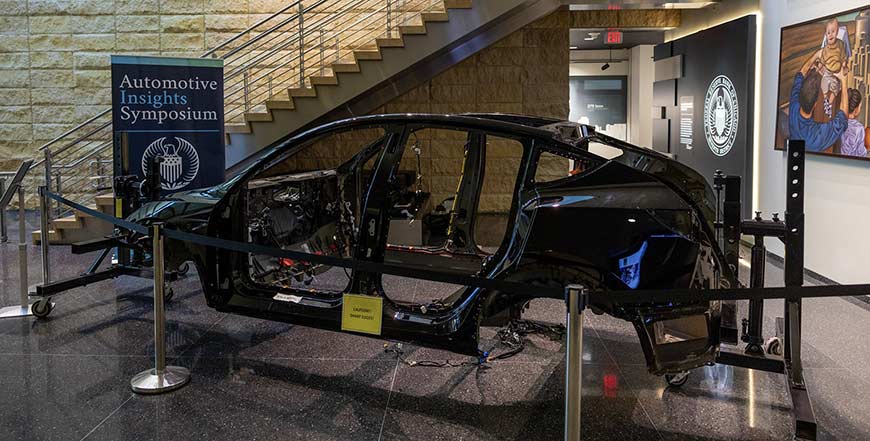
From the after-effects of the United Auto Workers strike to the 2024 outlook for U.S. vehicle makers, buyers, and sellers, the Chicago Fed’s Automotive Insights Symposium dug deep into salient issues in the industry
But if there was one theme that stood out at January’s edition of the annual event, held over two days at the Bank’s Detroit branch, it was, as one speaker put it, “China, China, China.”
Because of the global drive toward vehicle electrification, China’s growing output of electric vehicles, and continuing questions about how the U.S. government’s EV incentives will play against China’s control of many aspects of the technology’s supply chain, conference panelists had much to say about the Asian nation’s industry impact.
What follows are 11 telling quotes from participants in the symposium, comments that are, of course, just a fraction of all that was said. For a fuller picture of the days’ discussions, please visit the event page and find video replays, transcripts, slide decks, and speaker biographies.
1. China rising
There’s no getting around China, and I was really skeptical for a long time... Geely has a plant in the U.S. It’s a Volvo plant, but it’s owned by Geely, a Chinese company. BYD is building buses in the U.S., battery electric buses. Their eyes may have been bigger than their stomachs back in the early part of their coming to our shores. But it’s starting to get real now. Really real.
2. Affordability and the market
We wonder, ‘How long can the consumer be that resilient?’ There’s a lot of consumer debt. We’re seeing increases in [loan] delinquencies, and now defaults are starting to increase–still really small, but a little strain. And affordability is still a big issue. We estimate that about 10% of people who would normally buy new vehicles have dropped out of that market, maybe into used, because of the affordability issues.
3. EVs and politics
I think [the EV market] is going to continue to grow for sure, but I also feel like it’s still very much a policy-driven market. I kind of go by the adage of Woodward and Bernstein: You have to follow the money. And with the election looming and a potential big policy shift in terms of supporting EVs, in terms of emissions regulations and incentives and charging incentives and things like that, I think it has a chance to really chill the market in the U.S.
4. EV education
There’s still a lot of rumors and fears and anxiety out there about owning a battery electric vehicle. Some of them are reasonable. If you do have a long commute, that’s a reasonable anxiety. But for 99% of users, for 96% of the time, a battery electric vehicle is a better solution for them. And, so, educating the market to help the adoption of these vehicles, I think, is going to be a really key factor.
5. EV woes?
We’ve all heard that EV sales are slowing. And companies are changing their approach or changing their targets or stretching out their time horizon for when they will get to those goals that they set. But still last year, electrified vehicles, battery electrics, plug-ins, even hybrids were the fastest growing segments of the U.S. market.
6. Attracting engineering talent
Everybody that’s going through school right now is seeing names like Google and Amazon and Apple, and those are the sexy employers to go to. So we’ve really got to continue to get the message out there that, ‘Hey, a car is really a phone on wheels these days, so there’s tons of interesting work you can do in this industry.’
7. Being nimble
Traditional companies will take two years in the boardroom to even decide whether to do it or not, okay? So it’s no different than the Roman empire, the Greek empire, the Ottoman empire. People die because they don't move fast. It is not the big that eat the small. It’s always the fast that eat the slow. That’s what’s happening here. And the Chinese are very good at following Tesla.
8. Peek-a-boo
I have a new grandbaby. And you put your hand over baby’s eyes, they think whatever they’re looking at has gone away. And then you take it off, and, ‘Oh, you’re still there,’ right? Well, that’s not how we can play with China. We can’t just go, ‘Well, we don’t see you.’ Because every other country in the world and many of our most important sources for what we want to do with electrification are deepening their relationships with China.
9. Supply-chain friendships
There’s been a lot of talk in Washington about working with like-minded allies, like-minded countries, like-minded governments … More than 50% of the world’s GDP, more than 3/4 of our global population, is going to the polls this year. So are our friends going to stay our friends, going to stay like-minded? Or are the ones who aren’t like-minded, are they going to become more like-minded?
10. Critical minerals, indeed
There is a whole supply chain that has to be built. We are just trying to do one part of it, and we are struggling. It’s complicated. China has been doing it for 30-plus years. They are the largest producer, the largest miners. They are the largest refiners. They control 85-percent-plus of the refining. And for certain elements—…the more rare of the rare earths—that is almost 100%. They also control the supply chain.
11. UAW and the Detroit 3
The parties came out of this with relationships that were worse, not better. And now if all goes well, they will dedicate themselves to some repair and rebuilding, because they cannot accomplish what they need to accomplish… without a relationship that lets them work on quality, safety, continuous improvement, and the rest.
Further reading
The event page hosts video replays of the symposium’s panel discussions, transcripts, slide decks, speaker biographies, and the agenda and session titles.










